Tennis stars may pull out of Australian Open after blasting organisers
Australian Open organisers have been blasted by some tennis players for ‘changing the rules on them’. Here’s evidence they are wrong.
Victoria
Don't miss out on the headlines from Victoria. Followed categories will be added to My News.
Tennis stars could pull out of the Australian Open — blasting organisers for changing lockdown rules “overnight”.
But tournament officials insist the stringent protocols, which have confined 72 players to their hotel rooms, were clear from the start.
Any player on a flight with an infected passenger has been told they must isolate and can’t leave to train. Players not isolating can train for up to five hours a day.
It was revealed on Sunday night that a third charter flight had recorded a positive COVID-19 test, with a passenger travelling from Doha set to trigger another hard quarantine period.
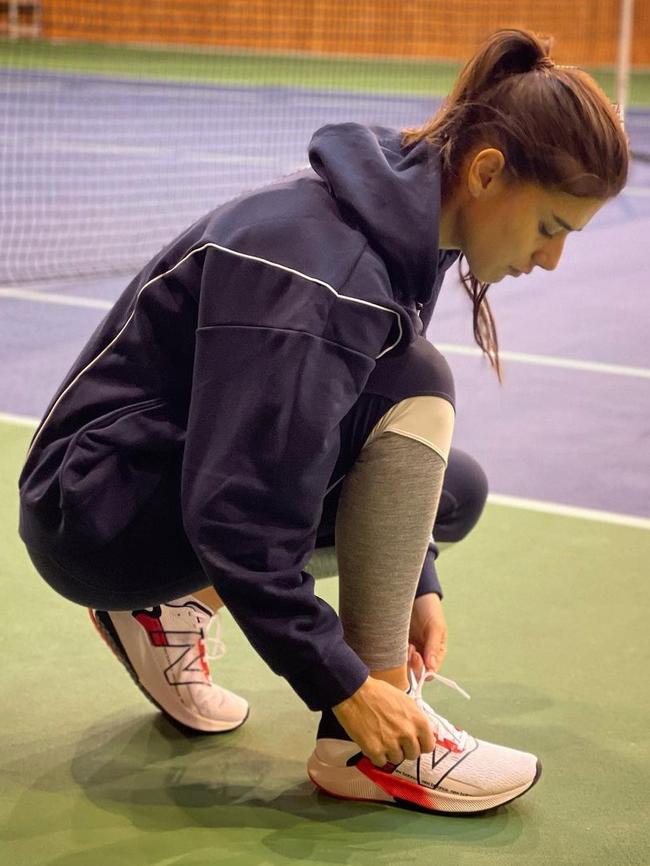
Romanian player Sorana Cirstea led the growing backlash against Open officials, saying being locked in a room unable to train was unworkable.
“I was planning to play the tournament because they promised daily 5h quarantine exemption where we could go practice, do a gym session and rehab,’’ she wrote on social media.
“This was the deal before signing up to this … but the rules changed “overnight”!”
“What we cant do is COMPETE after we have stayed 14 days on a couch. This is the issue, not the quarantine rule.”
“I would need at least 3 weeks after in order to be in decent form again and compete at a high level!
“If they would have told us this rule before I would not play Australia … I would have stayed home. They told us we would fly at 20% capacity, in sections and we would be a close contact ONLY if my team or cohort tests positive.”
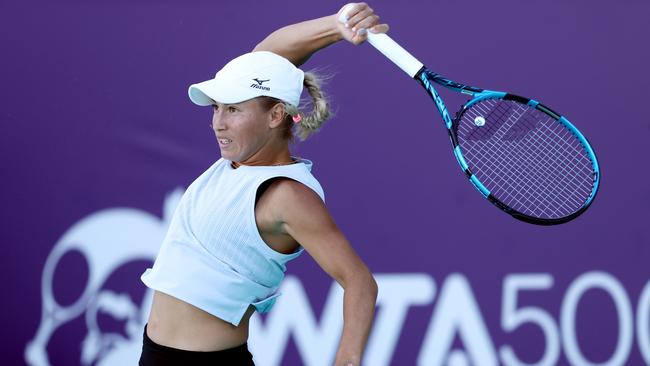
Kazakh three-time grand slam quarter-finalist Yulia Putintseva was also furious.
“What I don’t understand is that, why no one ever told us, if one person on board is positive the whole plane need to be isolated. I would think twice before coming here,’’ she posted.
COVID-19 Quarantine Victoria Commissioner Emma Cassar hit back, saying there had been no change to the outbreak response plan outlined to Tennis Australia, players and their teams.
“The rules for close contacts haven’t changed and there is no other way that you can consider this,” Ms Cassar said.
“If you are on a plane for 16-24 hours with air that circulates throughout the plane, you are a close contact. That hasn’t changed.”
VOICE OF REASON
But now, a Russian-born Kiwi Australian Open contender has finally given the game’s entitled stars some perspective on their quarantine plight.
And Artem Sitak has disputed claims Tennis Australia did not properly inform players of what could happen if travellers on their flights to Australia tested positive for COVID-19.
“I want to clarify something — we had a call with Tennis Australia about a month ago and not a lot of players were on the call, which was surprising to me, but hey, that’s how it was,” Sitak, who was on a flight where an attendant tested positive and is stuck in quarantine for 14 days, said.
Doubles plater Artem Sitak with a clear-eyed take on the current #AusOpen debacle. https://t.co/EkRLVJRSum
— Ben Rothenberg (@BenRothenberg) January 17, 2021
“So basically, the organisers, they told us the risks that we’re going to be undertaking and they did mention that if somebody tests positive on the flight it’s going to be up to the health authorities to decide whether to quarantine all the flight or just isolate compartments of the plane.
“Now, in our case where the flight attendant tested positive, of course, the whole plane has to be isolated.
“Knowing the very, very strict rules of Australian Government regarding the virus, after that call, in my mind, I knew that if, for some reason, somebody tested positive on the plane, I’m going to have to quarantine for 14 days, so I was prepared to take that risk.”
Sitak urged players whining about their conditions to consider the plight of other Australians stuck abroad.
“I think we need to put some things into perspective where a lot of Australians right now cannot get back home because of restrictions and we, as foreigners of over a thousand people in Australia, we are going to be competing in a grand slam earning a lot of money,” he said.
“So just wanted to give a little perspective where I think we are still lucky to be here and (it’s) unfortunate circumstances with the quarantine, but that’s how it is.”
‘@ ME, KIDS’: STUBBS LASHES ENTITLED TENNIS STARS
Former Australian tennis player Rennae Stubbs has hit out as entitled players forced into lockdown, reminding those complaining about their circumstances that they have a minimum $100,000 payday on the horizon and have not had to pay for anything thus far.
Amid backlash and complaints from a handful of players now confined to their hotels rooms as a result of positive COVID tests on two charter flights, Stubbs has invited any of the complaining players to ‘@’ her and discuss.
“I have opinions on these tennis players complaining about the quarantine situation here in OZ & for the Australian Open & they’re NOT going to want to hear it from me,” Stubbs tweeted.
“Its got something to do with a minimum of $100,000, free flights, food & lots more, want to talk @ me kids?”
An infected broadcast worker who flew to Melbourne from Los Angeles has taken the number of quarantined coronavirus cases linked to the Australian Open to four.
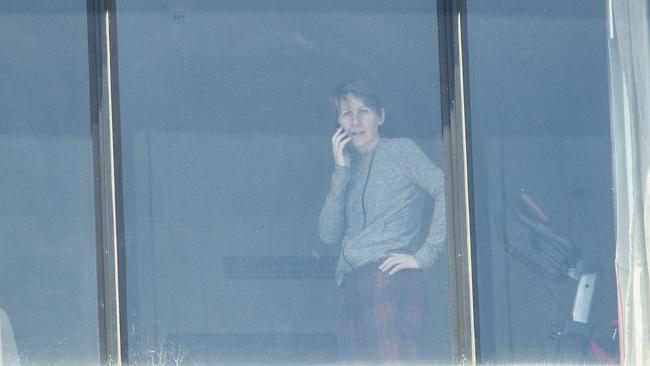
Those to contract coronavirus also include a flight crew member and another coach from the flight plus Sylvain Bruneau, the coach of 2019 US Open champion Bianca Andreescu, who flew in from Abu Dhabi.
About 120 close contacts from both charter flights were in hard quarantine.
Former Australian tennis star Pat Cash, who coaches Chinese player Qiang Wang, was awaiting a COVID-19 test result and called the rules “the most extreme” he had experienced.
“These are the rules and we’ll just have to go by them,” he said.
Two people — a player and an employee — have received an official warning for breaching quarantine restrictions.
One incident involved a person who bought others an UberEats meal and then opened his door “praising himself for his great efforts”.
The second was a player who tried to talk to a training mate down the hallway.
THE OPEN IS GOING AHEAD
Despite the furore, Tennis Australia boss Craig Tiley said there were no plans to call off the tournament.
“The Australian Open is going ahead and we will do what we possibly can to ensure that the players that don’t have a great situation have what is somewhat acceptable,” Mr Tiley said.
But the tournament boss came under fire after a media interview in October resurfaced, in which he said: “If a player has to quarantine and be stuck in a hotel for two weeks just before their season, that won’t happen.”
Mr Tiley’s predecessor, Paul McNamee expected the heat about the arrivals to subside “once the first ball is struck”.
“The fear around that is pervasive – I understand it – but it’s fear more than reality,” McNamee said.
Chair of Epidemiology at Deakin University, Catherine Bennett, said it seemed there had been a “communication breakdown” somewhere along the line.
“It seems that we’ve either stepped up the safety concerns beyond what was in the plan, or the plan itself wasn’t well communicated, or it’s one person who didn’t get the message,” Prof Bennett said.
There were no new local COVID-19 cases in Victoria and seven new hotel quarantine infections, not including the latest Australian Open case.
PLAYERS REACT TO QUARANTINE RULES
The shock of finding he was on a plane with three infected passengers was still to come when American player Nick Monroe walked into his room at Melbourne’s View Hotel.
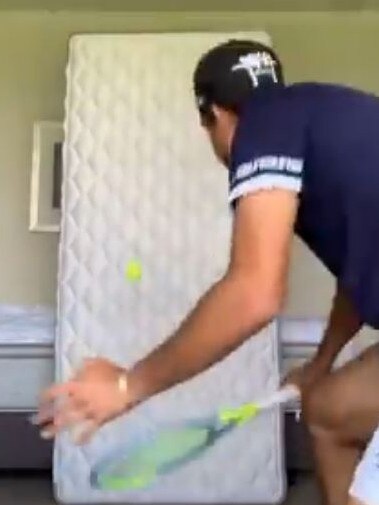
The view at his aptly named accommodation was the wall of an adjacent building.
Monroe tried to switch rooms — knowing there were more players to arrive — but was told the government knew he was there and, besides, the whole room would need to be sanitised again.
It was then he realised how strict lockdown life would be, or “extreme”, as he put it.
The hammer blow landed the next day, when Monroe found he’d be watching that wall, and little else, for 14 days, because of what were initially two positive cases on his flight from Los Angeles.
“It’s a crazy situation, but it’s all good, man — we make the best of it,” he told the Herald Sun. “Obviously, (Saturday’s news) was a bit of a surprise and I was a bit upset, having to be in the room for 14 days and quarantining when I knew I was negative.”
The reactions from the tennis world have been wildly contrasting.
There were complaints about food, outrage at fellow passengers’ positive results affecting them and disappointment about perceived miscommunication.
On the other hand, the likes of dual Australian Open champion Victoria Azarenka and rising star Felix Auger-Aliassime thanked tournament boss Craig Tiley for the enormous effort to save the event.
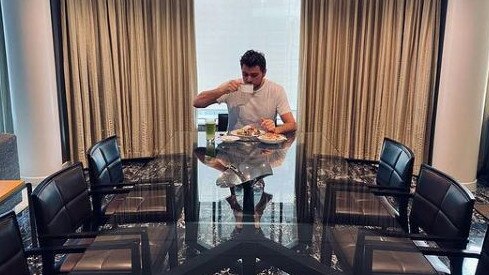
A serene — and “grateful” — Stan Wawrinka posted a photo of him having a drink and preparing to tuck into a big breakfast in his grand suite.
The 72 players on the two flights with positive COVID-19 cases won’t be able to spend five hours outside training, as their peers can. Instead, Pablo Cuevas and Yulia Putintseva are among those finding inventive ways to hit balls inside their hotel rooms.
Monroe had an exercise bike delivered to his room and hopes some weights and a medicine ball will arrive later.
Another of the 72, Mexico’s Santy González, has a bike and a mat for stretching exercises.
“It’s day three for us and it’s tough to be in a room that’s not so big and you can’t do much, so hopefully the days pass faster,” Gonzalez said.
“After not hitting a ball or getting to go out, we’re not going to be in the best shape. You need at least two weeks to be close to 100 per cent.”
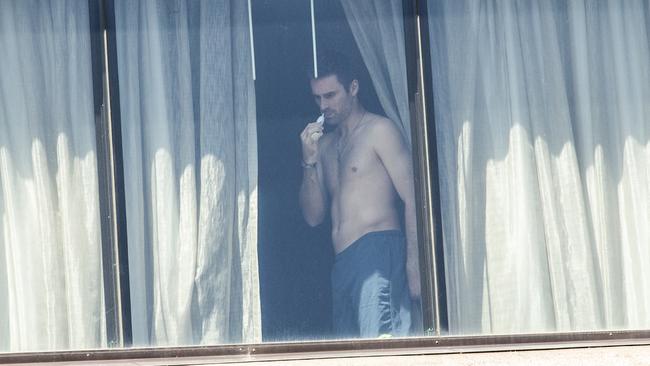
Australian husband and wife combination Luke Saville and Daria Gavrilova lived the 14-day hard lockdown experience after arriving home in November and October respectively.
Saville — who made the Australian Open doubles final last year — served his in Sydney while former top-20 star Gavrilova was in Perth in an interconnected room with fellow player Ellen Perez.
“We found things to do, but obviously didn’t have the stress of having to get ready for a slam,” Gavrilova said.
“We took it so slow when I came out and I can’t imagine getting into match mode straight away. You can’t go from zero to 100, but unfortunately that’s what players might have to do.”
Saville remembers struggling physically when he emerged and says he wouldn’t play a warm-up event days later if he was in lockdown.
“It’s less than ideal being confined to a room, then getting out with a slam a week later, especially best-of-five (sets),” he said.
“Tiley explained it well. At the other tournaments around the world, the (tennis) bubble is safer than the community, whereas here in Australia, the community is the safest part.”


